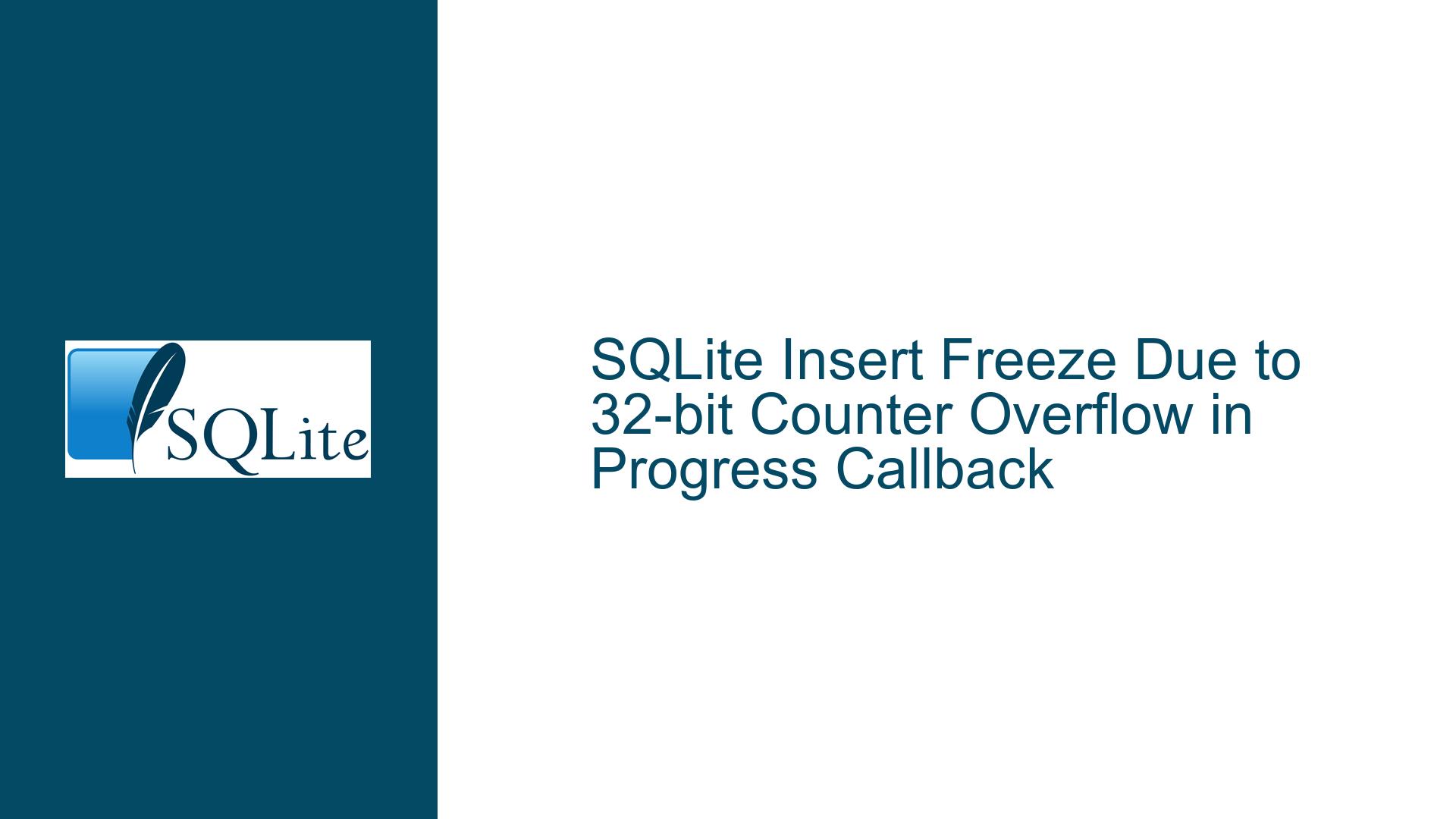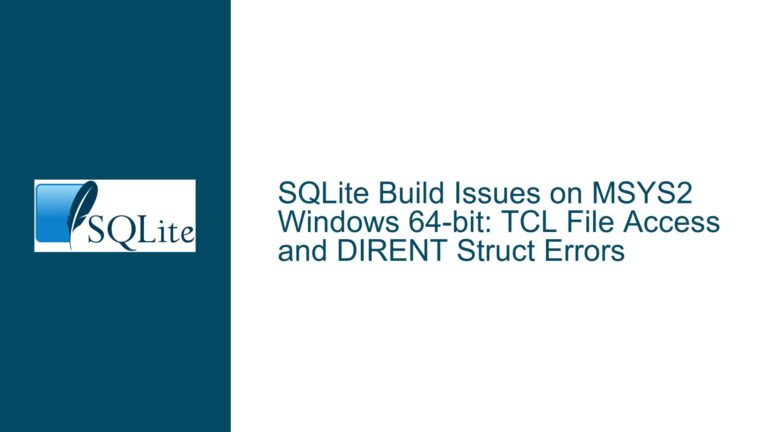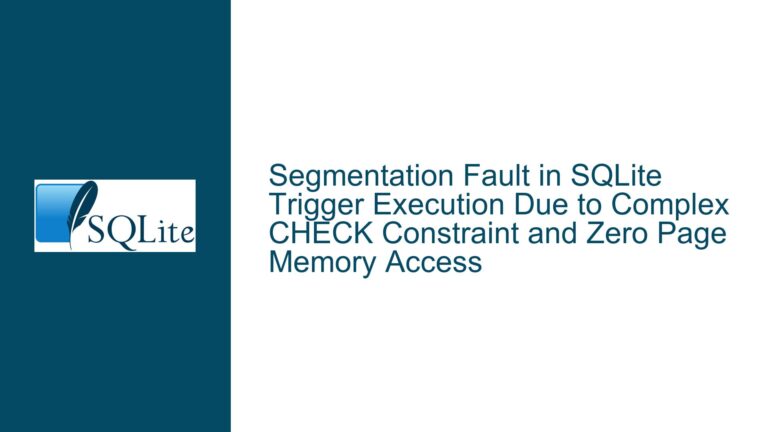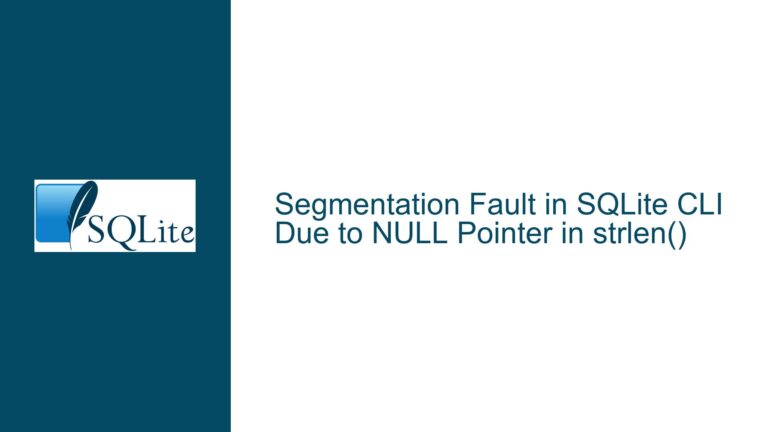SQLite Insert Freeze Due to 32-bit Counter Overflow in Progress Callback
SQLite Insert Freeze During Large Dataset Insertion
When inserting a large dataset into an SQLite table, such as 600 million records, users may encounter a "freeze" during the insertion process. This freeze is not a complete program unresponsiveness but rather a halt in VFS (Virtual File System) traffic and memory allocations. The process appears to stall, and Windows process information shows freezing I/O numbers. This issue is particularly noticeable when using a progress callback to monitor the insertion process.
The freeze occurs in the sqlite3VdbeExec function, specifically within a loop that checks the progress of the operation. The loop condition involves two key variables: nVmStep and nProgressLimit. The nVmStep variable represents the current step count in the VDBE (Virtual Database Engine) execution, while nProgressLimit is a threshold that determines when the progress callback should be invoked. The loop continues to execute as long as nVmStep is greater than or equal to nProgressLimit, and the progress callback is defined.
In the reported case, nVmStep is observed to be 0xFFFFFFFE, and nProgressLimit increases by 0xA (the value of db->nProgressOps). Given the 32-bit nature of these variables, nProgressLimit will never exceed nVmStep due to integer wrapping. This results in the loop condition never being met, causing the progress callback to freeze while the insertion process continues in the background.
32-bit Integer Overflow in Progress Callback Loop
The root cause of the freeze is a 32-bit integer overflow in the progress callback loop within the sqlite3VdbeExec function. The nVmStep and nProgressLimit variables are 32-bit integers, and their values are subject to wrapping when they exceed the maximum 32-bit integer value (0xFFFFFFFF). In the reported scenario, nVmStep is close to the maximum value (0xFFFFFFFE), and nProgressLimit is incremented by 0xA in each iteration. Due to the wrapping behavior, nProgressLimit will never surpass nVmStep, causing the loop to stall.
The issue is exacerbated by the fact that not every increase in nVmStep triggers the progress callback. Specifically, the progress callback is only invoked when the VDBE executes a "Goto" instruction. This means that nVmStep can wrap around to zero without ever reaching the progress callback, leading to a situation where the progress loop is ignored until nVmStep reaches a large value again. This behavior can cause the progress callback to appear unresponsive, even though SQLite continues to execute the insertion process in the background.
The problem is particularly relevant in scenarios involving large datasets, where the number of VDBE steps can easily exceed the 32-bit integer limit. The issue was initially observed on a Windows system, but it could potentially affect any platform where SQLite is used with 32-bit integers for progress tracking.
Upgrading to 64-bit Counters and Implementing Robust Progress Monitoring
To resolve the issue, users should upgrade to the latest prerelease snapshot of SQLite, which includes a fix for the 32-bit counter overflow problem. The fix involves increasing the resolution of the counters to 64-bit, which significantly reduces the likelihood of integer overflow during large dataset insertions. This change ensures that nVmStep and nProgressLimit can handle much larger values without wrapping, thereby preventing the progress callback from freezing.
While the upgrade to 64-bit counters is the primary solution, users should also consider implementing robust progress monitoring mechanisms to avoid similar issues in the future. One approach is to use a combination of progress callbacks and periodic checks to ensure that the insertion process is proceeding as expected. This can be achieved by setting a reasonable value for db->nProgressOps and monitoring the progress callback for any signs of stalling.
Additionally, users should be aware of the potential performance implications of using 64-bit counters on 32-bit architectures. While the performance penalty is expected to be minimal, it is important to test the application on the target platform to ensure that the increased counter resolution does not adversely affect performance.
For users who cannot immediately upgrade to the latest version of SQLite, a temporary workaround is to manually adjust the nProgressLimit value to avoid the overflow condition. This can be done by modifying the SQLite source code to use a smaller increment for nProgressLimit or by implementing a custom progress callback that handles large step counts more gracefully.
In summary, the freeze issue during large dataset insertions in SQLite is caused by a 32-bit integer overflow in the progress callback loop. Upgrading to the latest version of SQLite with 64-bit counters is the recommended solution, along with implementing robust progress monitoring mechanisms to prevent similar issues in the future. Users should also be mindful of the potential performance implications on 32-bit architectures and test their applications accordingly.
Detailed Analysis of the Progress Callback Mechanism
The progress callback mechanism in SQLite is designed to allow applications to monitor the progress of long-running operations, such as large dataset insertions. The callback is invoked periodically during the execution of the VDBE, allowing the application to perform tasks such as updating a progress bar or checking for user interruptions.
The progress callback is controlled by two key variables: nVmStep and nProgressLimit. The nVmStep variable represents the current step count in the VDBE execution, while nProgressLimit is a threshold that determines when the progress callback should be invoked. The progress callback is invoked when nVmStep exceeds nProgressLimit, and the nProgressLimit value is incremented by db->nProgressOps after each invocation.
In the reported issue, the nVmStep variable is observed to be 0xFFFFFFFE, which is very close to the maximum 32-bit integer value (0xFFFFFFFF). The nProgressLimit variable is incremented by 0xA in each iteration, but due to the 32-bit integer wrapping behavior, nProgressLimit will never exceed nVmStep. This results in the progress callback loop stalling, causing the progress callback to appear unresponsive.
Impact of 32-bit Integer Wrapping on Progress Monitoring
The 32-bit integer wrapping behavior has a significant impact on the progress monitoring mechanism in SQLite. When nVmStep reaches the maximum 32-bit integer value, it wraps around to zero, and the progress callback loop is effectively reset. This means that the progress callback may not be invoked for a long period of time, leading to the appearance of a freeze.
The issue is further complicated by the fact that not every increase in nVmStep triggers the progress callback. Specifically, the progress callback is only invoked when the VDBE executes a "Goto" instruction. This means that nVmStep can wrap around to zero without ever reaching the progress callback, leading to a situation where the progress loop is ignored until nVmStep reaches a large value again.
Performance Considerations for 64-bit Counters on 32-bit Architectures
While the upgrade to 64-bit counters resolves the integer overflow issue, it is important to consider the potential performance implications on 32-bit architectures. The use of 64-bit counters may introduce additional overhead, particularly on platforms where 64-bit arithmetic is not natively supported.
In most cases, the performance penalty is expected to be minimal, as the VDBE execution involves multiple assembler instructions for each step. However, users should test their applications on the target platform to ensure that the increased counter resolution does not adversely affect performance.
Best Practices for Progress Monitoring in SQLite
To avoid issues with progress monitoring in SQLite, users should follow these best practices:
Upgrade to the Latest Version: Always use the latest version of SQLite, which includes fixes for known issues and improvements to the progress monitoring mechanism.
Set a Reasonable
db->nProgressOpsValue: Ensure that thedb->nProgressOpsvalue is set to a reasonable number that balances the frequency of progress callback invocations with the overhead of the callback itself.Implement Robust Progress Monitoring: Use a combination of progress callbacks and periodic checks to ensure that the insertion process is proceeding as expected. This can help to detect and resolve issues early.
Test on Target Platforms: Test the application on the target platform to ensure that the progress monitoring mechanism works as expected and does not introduce performance issues.
Monitor for Integer Overflow: Be aware of the potential for integer overflow in the progress monitoring mechanism, particularly when dealing with large datasets. Consider using 64-bit counters if necessary.
By following these best practices, users can ensure that their SQLite applications are robust and reliable, even when dealing with large datasets and long-running operations.






